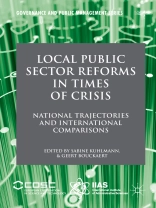This book compares the trajectories and effects of local public sector reform in Europe and fills a research gap that has existed so far in comparative public administration and local government studies. Based on the results of COST research entitled, ‘Local Public Sector Reforms: an International Comparison’, this volume takes a European-scale approach, examining local government in 28 countries. Local government has been the most seriously affected by the continuously expanding global financial crisis and austerity policies in some countries, and is experiencing a period of increased reform activity as a result. This book considers both those local governments which have adopted or moved away from New Public Management (NPM) modernization to ‘something different’ (what some commentators have labelled ‘post-NPM’), as well as those which have implemented ‘other-than-NPM measures’, such as territorial reforms and democratic innovations.
Зміст
Preface; Geert Bouckaert and Sabine Kuhlmann.- Introduction. Comparing Local Public Sector Reforms: Institutional Policies in Context; Geert Bouckaert and Sabine Kuhlmann.- Part I. Re-Scaling Local Governance: Amalgamation, Cooperation, Territorial Consolidation.- Chapter 1. A Comparative Analysis of Amalgamation Reforms in Selected European Countries; Reto Steiner, Claire Kaiser, Grétar Thór Claire/Eythórsson.- Chapter 2. Explaining Trajectories of Municipal Amalgamations: A Case Comparison of the Netherlands and Flanders; Wout Broekema, Trui Steen and Ellen Wayenberg.- Chapter 3. What Causes Municipal Amalgamation Reform? Rational Explanations Meet Western European Experiences, 2004–13; Jostein Askim, Jan Erling Klausen, Signy Irene Vabo and K. Bjurstrøm.- Chapter 4. Does Inter-Municipal Cooperation Lead to Territorial Consolidation? Comparative Analysis of Selected European Cases in Times of Crisis; Jochen Franzke, Daniel Klimovský and Uroš Pinterič.- Part II: Managerial Reforms:From Weberian Bureaucracy to Performance Management?.- Chapter 5. Design, Trajectories of Reform and Implementation of Performance Budgeting in Local Governments: A Comparative Study of Germany, Italy, Lithuania and Norway; Hilde(Bjørnå, Riccardo Mussari, Vitalis Nakrošis, Christoph Reichard, Sabina Bankauskaitė Grigaliūnienė and Alfredo Ettore Tranfaglia.- Chapter 6. Impacts of NPM-Driven Performance Management Reforms and Ideologies in Napoleonic Local Governments: A Comparative Analysis of France, Portugal, and Turkey; Emil Turc, Marcel Guenoun, Marcel, Yüksel Demirkaya, Miguel Rodrigues and Jérôme Dupuis.- Chapter 7. Do They All Fail? A Comparative Analysis of Performance Related Pay Systems in Local Governments; Isabella Proeller, Anne‐Kathrin Meier, Dominik Vogel, Riccardo Mussari, Donatella Casale, Emil Turc and Marcel Guenoun.- Chapter 8. Human Resource Management Reforms and Change Management in European City-Administrations from a Comparative Perspective; Marco Salm and Christian Schwab.- Part III: Re-Organizing Local Service Delivery: From Government to Governance?.- Chapter 9. Public and Social Services Provision in European Countries. From Public/Municipal Sector to Market Liberalisation – and What Next?; Hellmut Wollmann.- Chapter 10. Waste Management Compared – from Public Service Delivery to Inter-Municipal Cooperation?; Harald Torsteinsen, Harald and Marieke Van Genugten.- Chapter 11. On the Road Towards Marketization? A Comparative Analysis of Nonprofit Sector Involvement in Social Service Delivery at the Local Level; Annette Zimmer, Lars Skov Henriksen, Steven Rathgeb Smith Rathgeb and Marlene Thøgersen.- Chapter 12. The Governance of Childcare in Transition: A Comparative Analysis; Pekka Kettunen, Filipe Teles, Carmen Navarro, Philipp Richter, Nikos Hlepas, and Muiris Mac Carthaigh.- Chapter 13. Rescaling of Planning Power: Comparing Functional Planning Reforms in Six European Countries; Panagiotis Getimis.- Part IV: Local Participatory Reforms, Political Leaders, and Citizens.- Chapter 14. Giving Citizens More Say in Local Government: Comparative Analyses of Change Across Europe in Times of Crisis; Angelika Vetter, Bas Denters, Norbert Kersting and Daniel Klimovský.- Chapter 15. Reforming Local Councils and the Role of Councillors. A Comparative Analysis of Fifteen European Countries; Anders Lidström, Harald Baldersheim, Daniel Klimovsky, Eva Marin Hlynsdóttir, Colin Copus and Pekka Kettunen.- Chapter 16. Have Mayors Will travel: Trends and Developments on the Direct Election of the Mayor: A Five Nation Comparison; Colin Copus, Angel Iglesias, Miro Hacek, Michal Illner and Anders Lidstrom.- Chapter 17. Local Democratic Renewal by Deliberative Participatory Instruments: A Comparative Study; Norbert Kersting, Jana Gasparikova, Jelizaveta Krenjova and Angel Iglesias.- Chapter 18. Reforming Local Governments in Times of Crisis: Values and Expectations of Good Local Governance in Comparative Perspective; Bas Denters, Andreas Ladner, Poul Erik Mouritzen and Lawrence Rose.- Conclusion: Tensions, Challenges, and Future ‘Flags’ of Local Public Sector Reforms and Comparative Research; Geert Bouckaert and Sabine Kuhlmann.
Про автора
Sabine Kuhlmann is Full Professor of Political Science, Administration and Organization at the University of Potsdam, Germany. Since 2011, she has been a member of the National Regulatory Control Council of the German Federal Government and, since 2012, Vice-President of the European Group for Public Administration (EGPA) and Chair of the COST-Action Loc Ref.
Geert Bouckaert is Professor at the Faculty of Social Sciences and the former Director of the KU Leuven Public Governance Institute, Belgium. He is Coordinator of the Policy Research Centre – Governmental Organization – Decisive Governance and President of the International Institute of Administrative Sciences (IIAS).












